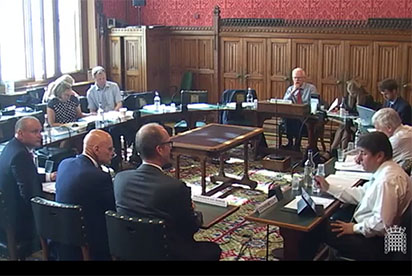National Quantum Technologies Programme examined by UK Parliament Committee
Professor Ian Walmsley, Professor Winfried Hensinger and Professor Kai Bongs gave oral and written evidence to the UK Parliament Science and Technology Committee (Commons) on 17 July 2018, along with other academics and representatives from the quantum technologies industry. The Committee’s focus is on the next phase of the National Quantum Technologies Programme, and what is needed to support the UK’s quantum industry going forward.
Below is an overview of the discussion at the hearing, you can read the full transcript or watch the session.
This is analogous to a moonshot: a once in a lifetime opportunity to put UK right at the forefront - NQIT Director Professor Walmsley in his evidence to the committee
The committee were interested in understanding the current thinking on the potential gains from quantum technologies and to learn more about the applications being developed. Professor Bongs highlighted that all quantum technologies underpin a wide variety of sectors from agriculture to space. On quantum computing Professor Walmsley referred to the design and understanding of new molecules that have potential for new drugs, to the understanding of complex new quantum materials that may be relevant for magnetism, superconductivity and the delivery of power.
Both Professor Walmsley and Professor Hensinger addressed the committee’s question on the overall societal impact of this technology, noting that this is a transformative technology that we need to be aware of and continue to explore and have dialogue about, to understand both the opportunities and the risks, engaging closely with the technology and regulating it, as required.
The committee also asked about timescales and whether the government is providing sufficient support and whether there is the right level of focus versus breadth.
If our objective is to build a quantum technology industry sector in which the UK has a leading role, there is a critical mass argument. If you under-invest and do not build critical mass, you simply will not have a successful ecosystem – Professor Walmsley
On the focus of the next phase the committee asked about the proposed innovation centres in relation to the hubs and whether this framework will deliver the next phase. Professor Bongs noted that we have four diverse hubs that complement each other, leading to good synergies in the supply chain between the hubs which then build the economic ecosystem to drive it forward and sustain it. Professor Walmsley added that the hubs and the technology drive that is coming from them need to be interactive with the innovation centres, but that the character of the innovation centres and their specific location could be quite different.
Discussion also looked at how to ensure that the manufacturing and engineering capability stays in the UK, along with the necessary skills base. It was noted that an ecosystem is needed, based on the hubs and innovation centres that work for engineering and manufacturing and the many start-ups that are emerging. Both Professor Walmsley and Professor Bongs set out how business models could arise in the overall ecosystem. Professor Hensinger gave one example, from amongst the spinout companies currently being developed, by referring to the plans at the University of Sussex for a spinout company to manufacture quantum computers here in the UK, in conjunction with the innovation centres.
In summary, Professor Walmsley, looking towards Phase 2, concluded we need to build on current success, through the continuation of the hubs, with manufacturing and engineering capacity enhanced by the innovation centres and support for the programme by building the right skills base, not only at PhD level, although that is critical, but also more broadly.
Photo credit: UK Parliament/Jessica Taylor. Parliamentary copyright image reproduced with the permission of Parliament
